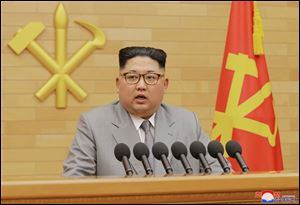
EDITORIAL
The U.S and the world in 2018
1/8/2018

Kim Jong Un
What are the opportunities, and where are the dangers, for the United States abroad in 2018? The picture is mixed.
The Middle East is unstable. The Arab Spring is not over, due in no small part to the ease of mobilizing radical street forces through social media. Former bellwether Saudi Arabia is shaky, due to its regional duel as a Sunni nation with Shiite Iran. Iran itself may be imploding internally — that is an opportunity, for a modicum of freedom and peace.
Russia may stabilize once President Vladimir Putin is re-elected in March, although U.S. relations with it will likely continue to be turbulent for many reasons and on many fronts. Mr. Putin is a Stalinist and a killer without remorse. There is little opportunity for our nation there.
Click here to view more Blade editorials | Check out the Behind The Editorial series
The future configuration in the Korean peninsula and its relationship to the United States could become less threatening in 2018 than in 2017. Variables in that equation will include relations between North and South occasioned by the Winter Olympics games, whether North Korean leader Kim Jong Un now feels content with his weapons capacity, and whether the United States will find itself able to respect South Korean president Moon Jae-in’s desire to improve relations with the North. Here, for the first time in a long time, is an opportunity for relative peace.
The Europeans need to be able to rub salve on any wounds they have suffered in the transition in their relations with the United States, from Barack Obama to Donald Trump. They themselves are suffering some trauma from the ongoing British withdrawal from European Union membership. The Germans are still writhing this year from the pains of forming a new governmental coalition after last year’s elections. The Italians have elections coming up, with Silvio Berlusconi, the bad boy of Italian politics, threatening a comeback. There are also the Spanish Catalans playing with a succession possibility and some Eastern European nations, notably Austria, Hungary, Poland and Slovakia, playing with a return to 1930s-style fascism in government, and corrupt Bulgaria, Croatia, and Romania in the E.U. deck. The U.S. is perhaps wise to stand back. There is not much for us opportunity-wise there.
RELATED: Human rights and national service
Latin America and Africa will continue to suffer from the basic lack of interest in them on the part of the government in Washington, in spite of potential trouble spots in the Democratic Republic of the Congo, Mali, Nigeria, Somalia, South Sudan and Zimbabwe. Mr. Trump’s government and, particularly, his military advisers may come to see the wisdom of reducing the activities of the U.S. military in Somalia. That is an opportunity to extract ourselves from a commitment that serves no interest and no good.
The President has summarized his foreign policy as “principled realism and global competition,” and these are not bad concepts to guide us in the coming days and months.